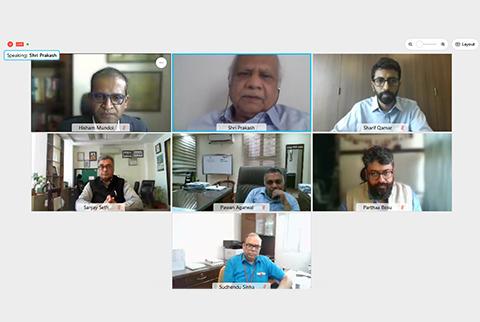TERI launches coalition to decarbonise urban freight in India

The Sustainable Urban Freight Coalition (SUFC) aims to promote and achieve sustainability in the sector and move towards achieving the vision of decarbonisation of India’s transport sector by 2030.
New Delhi, June 25: The Energy and Resources Institute (TERI) today launched the Sustainable Urban Freight Coalition (SUFC), a consortium of public and private stakeholders of urban freight in India to bring together industry, academia, and civil society for Sustainable Urban Freight (SUF) practices.
The coalition was launched at a virtual event by Pawan K Agarwal, Special Secretary, Logistic Division, Ministry of Commerce and Industry (MoCI). “The journey of facilitating sustainable urban freight in cities shall be largely driven by local actions and urban local bodies. The coordination and partnerships with different stakeholders – city and state government agencies, private freight operators, OEMs, etc. will play a better role in facilitating solutions.”
The event also included the launch of the SUFC charter which laid out the aims, ambitions, and activities of the coalition.
Presently, there is huge potential in the urban freight sector to achieve the vision of decarbonising transport by 2030. According to TERI’s ‘Roadmap for Electrification of Urban Freight in India’, a 14% reduction in CO2 emissions is attainable in the small commercial vehicle segment in India’s urban freight, with higher penetration of electric vehicles (EV).
So far, the SUFC has partners such as Directorate of Urban Land Transport, Govt of Karnataka, and the Surat Municipal Corporation from the government. Partners from the private sectors include the Society of Indian Automobile Manufacturers (SIAM), TATA, Mahindra Rise, among others.
The SUFC has already engaged with urban local bodies (ULBs) in Surat and Bengaluru for SUF solutions. The Surat Municipal Corporation (SMC) aims to switch all of its 908 vehicles engaged in solid waste management (SWM) to EVs. The city’s textile sector, which accounts for 44% of its urban freight, has also shown interest in EV adoption.
SUFC is an initiative by TERI and Environment Defense Fund (EDF). Hisham Mundol, Chief Advisor, EDF India emphasised the importance of freight in the overall economy and livelihoods and said that the focus of the Indian pathway to sustainable urban freight also incorporates better health and livelihoods of citizens.
“The focus should not be just making urban freight cheaper and greener. It shall focus on how greening can make it cheaper and this will accelerate the process,” he added.
Talking about the initiative, Sanjay Seth, Senior Director, Sustainable Habitat, TERI said that ‘what gets measured gets managed’ and TERI has taken an important step bringing all the stakeholders on one platform to study the problems and experiment the low-carbon solutions.
About Sustainable Urban Freight Coalition
The Sustainable Urban Freight Coalition is a growing consortium of public and private stakeholders of Urban Freight in India to bring together industry, academia and civil society for knowledge creation & dissemination and sharing for Sustainable Urban Freight (SUF) practices. TERI’s Sustainable Urban Freight Coalitionisaimed at creating local and national support structures for cost and emission reduction from Urban Freight in India. This Sustainable Urban Freight (SUF) Coalitionaims to share, create and disseminate knowledge to facilitate interventions to reduce emissions and costs from urban freight activities in India. The SUF Coalition will facilitate continuous initiatives through both policy and practice. One of the major objectives of this working group is to facilitate clean technology pilots in various applications of urban freight in Indian cities.
SUF Coalition includes urban local bodies, vehicle manufacturers, research institutions, central and state government agencies, civil society members and all other stakeholders of Urban Freight in India.
See more here
About TERI
The Energy and Resources Institute (TERI) is an independent, multi-dimensional organization, with capabilities in research, policy, consultancy, and implementation. It has pioneered conversations and action in the energy, environment, climate change, and sustainability space for over four decades.
The institute's research and research-based solutions have had a transformative impact on industry and communities. Headquartered in New Delhi, it has regional centres and campuses in Gurugram, Bengaluru, Guwahati, Mumbai, Panaji, and Nainital, supported by a multi-disciplinary team of scientists, sociologists, economists and engineers, and state-of-the-art infrastructure.
